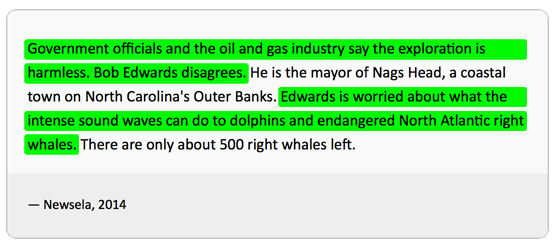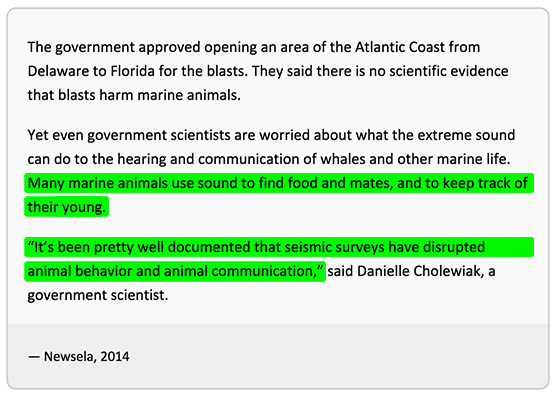Click on a box to explore each topic.
1. Supporting Explicit Ideas Using Evidence
The following excerpt shows highlighted evidence supporting the idea that there is disagreement about the impact of oil and gas exploration.
 [Highlighted text begins.] Government officials and the oil and gas industry say the exploration is harmless. Bob Edwards disagrees. [Highlighted text ends.] He is the mayor of Nags Head, a coastal town on North Carolina's Outer Banks. [Highlighted text begins.] Edwards is worried about what the intense sound waves can do to dolphins and endangered North Atlantic right whales. [Highlighted text ends.] There are only about 500 right whales left. Newsela, 2014
[Highlighted text begins.] Government officials and the oil and gas industry say the exploration is harmless. Bob Edwards disagrees. [Highlighted text ends.] He is the mayor of Nags Head, a coastal town on North Carolina's Outer Banks. [Highlighted text begins.] Edwards is worried about what the intense sound waves can do to dolphins and endangered North Atlantic right whales. [Highlighted text ends.] There are only about 500 right whales left. Newsela, 2014
The idea that there is disagreement about the impact of oil and gas exploration is stated directly in the text along with the supporting evidence. The author describes how government officials and the oil and gas industry do not think the exploration will harm animals, while Edwards is concerned about what the sounds waves will do to marine animals.
The following excerpt shows highlighted evidence supporting the inference that seismic surveys can threaten the survival of marine animals.
 The government approved opening an area of the Atlantic Coast from Delaware to Florida for the blasts. They said there is no scientific evidence that blasts harm marine animals. Yet even government scientists are worried about what the extreme sound can do to the hearing and communication of whales and other marine life. [Highlighted text begins.] Many marine animals use sound to find food and mates, and to keep track of their young. “It’s been pretty well documented that seismic surveys have disrupted animal behavior and animal communication, [Highlighted text ends.]” said Danielle Cholewiak, a government scientist. Newsela, 2014
The government approved opening an area of the Atlantic Coast from Delaware to Florida for the blasts. They said there is no scientific evidence that blasts harm marine animals. Yet even government scientists are worried about what the extreme sound can do to the hearing and communication of whales and other marine life. [Highlighted text begins.] Many marine animals use sound to find food and mates, and to keep track of their young. “It’s been pretty well documented that seismic surveys have disrupted animal behavior and animal communication, [Highlighted text ends.]” said Danielle Cholewiak, a government scientist. Newsela, 2014
While the text does not directly state that seismic surveys can threaten the survival of marine animals, the highlighted text provides evidence that can lead you to that idea, and therefore supports that inference. The evidence indicates that there is, in fact, research that documents how seismic surveys disrupt animal behavior and communication. If these surveys interfere with animals’ ability to find food, to reproduce or to take care of their young, then the animals’ survival would be threatened. They may not be able to find food for themselves or their young, which could lead to death, and their population would continue to decrease if they are unable to find a mate to reproduce.